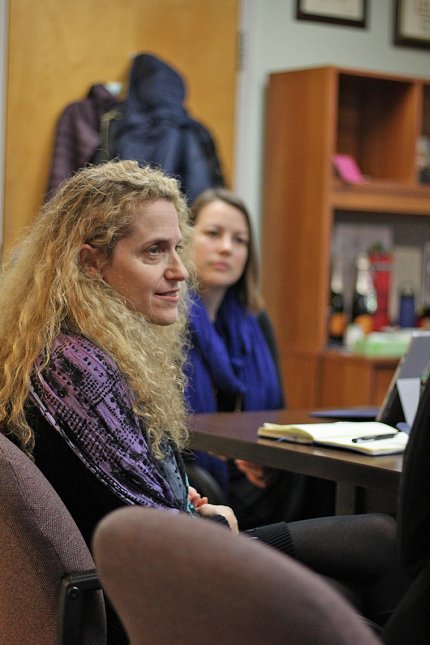Ensuring ‘Fertile Soil’ Everywhere
Stress, Adversity in Early Life Have Impact Across Lifespan

Our environment and experiences over the first 1,000 days of life have an enormous influence on our growing brain and long-term wellbeing, said Dr. Laura Stroud at the annual Stephen E. Straus Distinguished Lecture in the Science of Complementary Therapies.
“Things that happen to us when we’re very young have a much larger impact. This is a sensitive period of brain development and lifelong health,” said Stroud, director of the COBRE Center for Stress, Trauma and Resilience (STAR) at the Miriam Hospital and professor of psychiatry and human behavior at the Warren Alpert Medical School of Brown University. “If we can have an impact here early, we may be able to change the course of health and disease.”
Stress during pregnancy has a very profound impact on a child’s lifespan. Differences in stress and nutrition alter both mother’s as well as fetus’s biology, leading to differences in brain development and physiologic system formation in the offspring. This concept is known as “prenatal programming.” One way a mother communicates with her fetus is through the placenta, an organ that develops in the uterus during pregnancy.

Stroud said adverse childhood experiences are related to long-term health. Examples include emotional and sexual abuse, parental substance use, exposure to domestic violence, physical and emotional neglect, homelessness and parental divorce. Beyond the immediate household, adverse community events like poverty, discrimination, poor housing quality and violence can have lifelong consequences in children.
The long-term impacts of stress and adversity in early life affect a child physically and mentally, she noted. Exposure to these experiences can also lead to an earlier death.
“In the wake of the pandemic, we know that even more children and families are experiencing stress and trauma, and there’s been an unprecedented level of mental health problems in children and parents,” Stroud said. “It’s even more important to understand how we can build resilience in those who are exposed to stress and trauma.”
Protective experiences may prevent or mitigate some of these harmful effects, she suggested. Nourishing relationships help lead to optimal neurodevelopment and positive social, emotional and cognitive function. Examples include unconditional love from one person, helping others, having a trusted best friend or being part a group. Healthy behavior can also help children achieve milestones.
In terms of environmental influences, tobacco is one of the most common substances fetuses are exposed to in utero, she said. Rates of smoking are highest in younger mothers with lower incomes and in the South and Midwest. It is associated with poor outcomes across a child’s development.
In newborns, exposure to tobacco products is causally associated with sudden infant death syndrome, low birthweight and prematurity. In older children, obesity, disruptive behaviors and attention deficit disorder are also linked to smoking. Children with mothers who smoke are more likely to smoke and develop a nicotine addiction themselves.
New tobacco products such as e-cigarettes are also used during pregnancy, Stroud found. Many people perceive them as a safer alternative to traditional cigarettes. However, research suggests that e-cigarette use is associated with similar birth outcomes because nicotine, the addictive chemical found in tobacco, is present. These are even more pronounced in babies whose mothers smoke marijuana in addition to tobacco products.

Stroud’s research has shown that newborn babies with mothers who smoke show signs of stress and muscle tension. A month later, they were more irritable, had a harder time self-soothing and had a decreased attention span.
Subtle differences in behavior have even been detected during fetal development. Fetuses exposed to tobacco are more aroused and active compared to fetuses who have a mother who doesn’t smoke.
“Smoking is not a random exposure,” she said. “Mothers who smoke during pregnancy are less likely to receive adequate prenatal care, more likely to use other harmful substances, have higher stress levels and more problematic relationships, are more likely to have an unplanned pregnancy with or without a supportive partner and have multiple children.”
Pregnancy is a “window of opportunity for resilience,” the researcher suggested. Women are more likely to quit smoking when they are expecting than at any other time in their lives. Those who successfully quit reported higher levels of attachment to their baby during pregnancy. Quitting reverses many of the early effects, like low birthweight and prematurity. Expectant mothers also go to the doctor’s office for medical care more often.

Stroud said it’s important to look beyond what builds resilience at the individual and family level to community and structural levels. It is also critical to maintain resilience and support families in the postpartum period. Right now, she and her colleagues are studying how to best support parents during the most important period of a child’s life so that health outcomes improve.
“Pregnancy is a window of opportunity to foster resilience in two generations,” she emphasized.
There are many theories in psychology, for example, based on individuals who have blossomed despite growing up in difficult circumstances, she noted. Researchers must work with communities to change society so that all children have an opportunity to succeed.
She likened it to scientists studying one flower that grows through a crack in concrete.
“We’re starting to be aware that we need to make fertile soil so that all flowers can bloom, instead of focusing on the one flower that’s able to bloom despite all the obstacles,” Stroud said.
The yearly lecture honors the founding director of NCCIH (formerly the National Center for Complementary and Alternative Medicine), Dr. Stephen E. Straus. The event is supported by the Foundation for the National Institutes of Health with a gift from Bernard and Barbro Osher.
View the full lecture at https://bit.ly/3H7KPiG.
